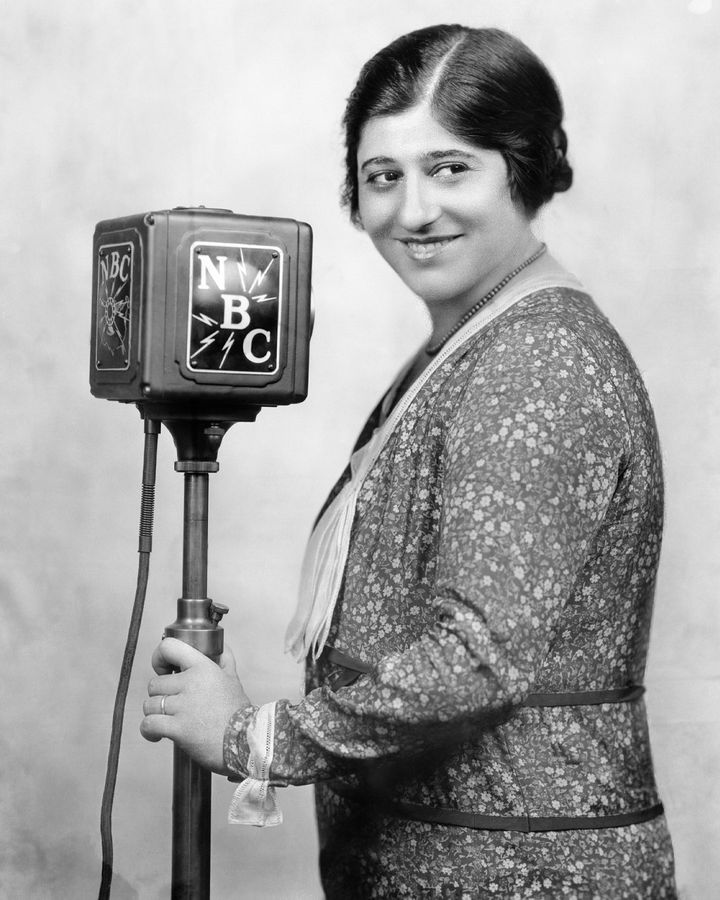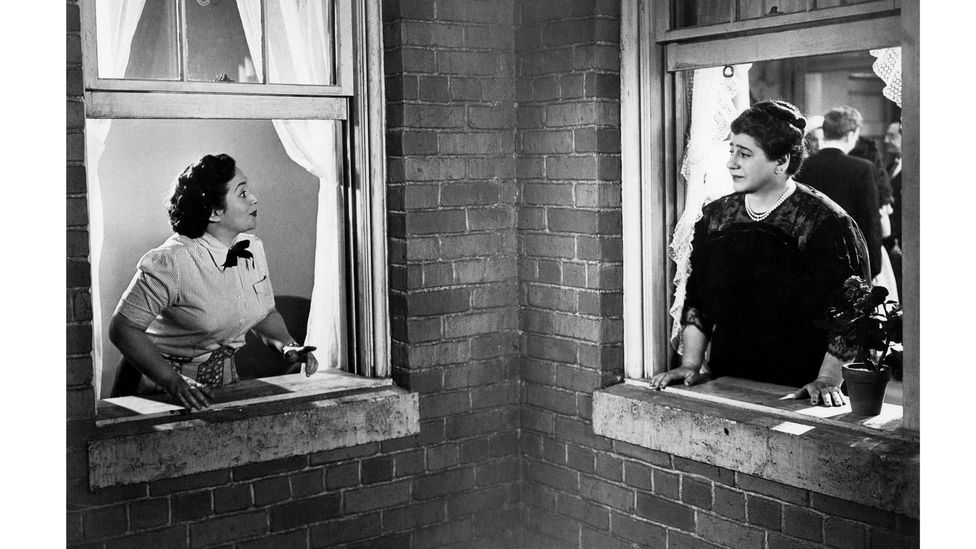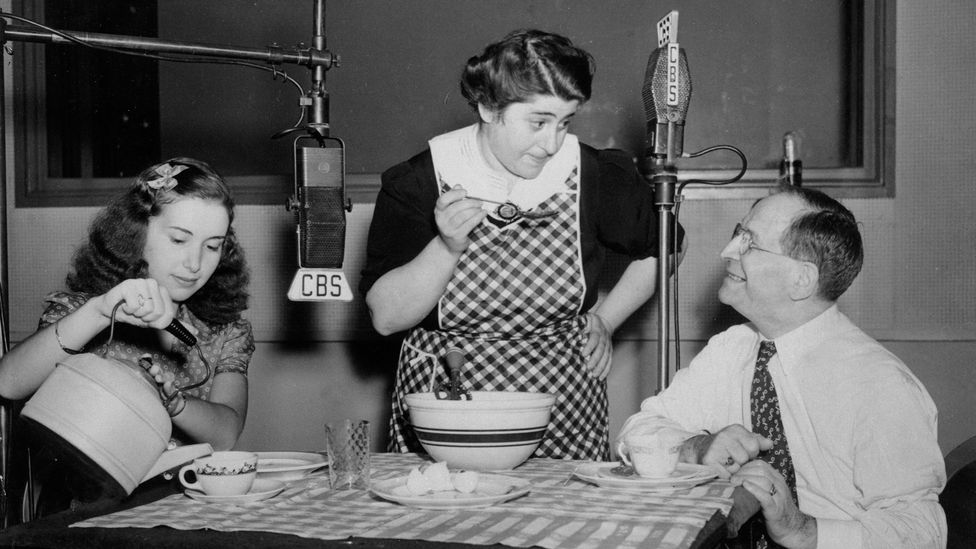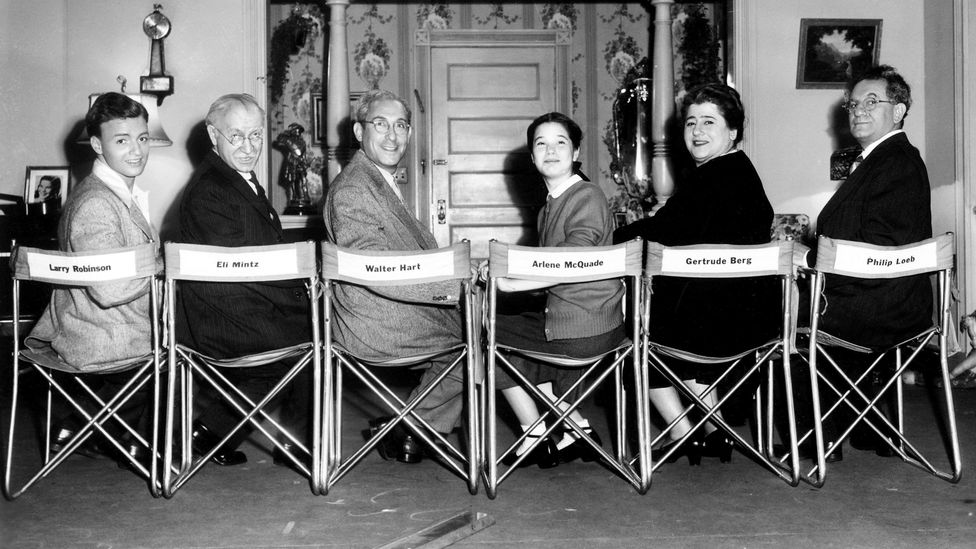Most people in showbusiness in 1948 wanted nothing to do with television. Commercial TV was just beginning to find its footing, and no one knew quite what to do with all of those hours on the air. Shows were bare-bones, low budget, and rarely even fully scripted. Everything was broadcast live. Just two per cent of the US population owned televisions, which were prohibitively expensive (a 12in console model could cost as much as $985, or more than $10,000 (£7,000) in today's terms). Programmes included the Gillette Cavalcade of Sports (which carried mostly boxing), the instructional show You Are an Artist, and the children's show Kukla, Fran and Ollie. Puppets were big at the time – simple, relatively foolproof and low cost. The puppets themselves, after all, didn't require a salary.
More like this:
- Is the age of the celebrity over?
- The power of reality TV in a pandemic age
- The long-lost Hitler sitcom that caused outrage
Radio star Gertrude Berg looked at this mess and wanted in. Desperately. She had become one of the most famous voices in the US with her radio show The Goldbergs, which she had created, written, and starred in for 17 years, most of them on the CBS radio network. She played Molly Goldberg, a sweet-but-assertive, always meddling wife and mother of two. The family lived in a Bronx tenement and dealt with the trifling troubles that ensued among family members, neighbours and friends. Through the Great Depression and World War Two, Molly had become a radio-sitcom sensation. She was voted the second most-trusted woman in the US, behind only First Lady Eleanor Roosevelt.

Berg's radio show was a hit for CBS, running from 1929 to 1948 (Credit: Alamy)
By 1948, however, her radio show had come to a natural end, her radio children having grown up and moved out. With TV on the horizon, she had an idea: What if she started it all over again, this time on television? She was nearly 50 years old, but that hardly mattered to her. She figured: how could TV be picky if it could land this big a star?
So she marched into the office of William S Paley, the glamorous and powerful man at the helm of both CBS radio and television, and demanded he give her a chance on TV. Her idea had been rejected by the other networks – ABC, NBC, and a fourth network run by a TV manufacturer called DuMont – and had already been turned down once by Paley as well. Now she reminded him: she'd helped get his radio network through the Depression. She deserved a chance.
This time, in the autumn of 1948, he relented. The result was television's first family sitcom. The Goldbergs set the blueprint for the shows usually referred to as the early family-sitcom classics, such as Father Knows Best and Leave It to Beaver. But in some key ways, her show was quite unlike the white-bread family classics that came in her wake: she proudly highlighted her TV family's Jewishness, seamlessly including Jewish foods, holidays, and broader cultural markers – the family loved to go to Pincus Pines, a fictional Catskills resort. She spoke with a Yiddish accent. She gave us one of TV's first catchphrases: "Yoo hoo, Mrs. Bloom!" she'd yell out her apartment window if she wanted to gossip with the neighbour.

Berg created one of TV's first catchphrases, when calling out to her neighbour through the window (Credit: Alamy)
Berg was a pioneer in another way, too: she pre-dated even Lucille Ball, whose I Love Lucy premiered in 1951, as a woman who produced and starred in her own show. Berg went even further, writing all of her own material and her own commercial spots. She became such a big TV star that she had her own line of house dresses and a popular cookbook. But a run-in with the Hollywood Blacklist curtailed her promising television career and all but erased her legacy as TV's first Jewish mother, a story I detail in my upcoming book, When Women Invented Television.
After Paley gave her the go-ahead, The Goldbergs went live on CBS on 10 January, 1949. The show emphasised its central conceit – immigrant parents and their assimilated offspring – by casting gentiles as the Goldberg children: Arlene McQuade as preteen Rosalie and Larry Robinson as teenager Sammy. Eli Mintz played Molly's sidekick, her Uncle David. And her husband was portrayed by Philip Loeb, a stage actor and showbusiness labour activist. As luck would have it, this core cast had the kind of instant on-screen chemistry we know is crucial to a television series' long-term success – even though no one knew what that looked like at the time. Berg and Loeb, in particular, made a compelling and natural television couple.
The show was, as Life magazine described it, "an immediate hit on television… a classic in the field, The Goldbergs employ a basic formula so neatly suited for television it may well be the forerunner of a whole rash of televised domestic serials". The New York Times' first major TV critic, Jack Gould, put it this way: "The Goldbergs came to television last week and the word this morning is that they probably are going to be there for about as long as they choose."
Accordingly, the series soon landed a sponsor, Sanka instant decaffeinated coffee, and Berg came up with an ingenious way to promote it: she would write the ads herself and deliver them in character. (At the time, shows were usually underwritten by one advertiser, who had a say over both creative decisions and how the ads would be presented in the broadcast.) The resulting spots, seamlessly woven into the episodes themselves, were as compelling as the plots. She might pontificate about how cranky all the guests were during the family's recent trip to Pincus Pines – until she introduced them all to the wonders of Sanka: "97 per cent of the caffeine is removed," she'd say, "but all the sleep is left in!" Sanka purchases increased by 57 per cent among her viewers.

Berg modelled herself as the ideal Jewish mother (Credit: Getty Images)
The Goldbergs was among the top television shows in the Hooper ratings, the audience-tracking service of the time. The series became the first former radio show to become so popular on TV that it actually returned to radio in a simulcast version, and it became the first TV show to spawn a film version. Berg won the first Emmy award ever given for best actress, beating Betty White – a trailblazer who hosted a daily talk show in Los Angeles and produced her own sitcom, Life with Elizabeth.
Berg took to the new level of fame – one that had her recognised on the streets, rather than simply a well-known voice. She had always been a master of self-mythology, building herself into the perfect image of a Jewish mother. Now she upped her game: she created and promoted her own line of affordable house dresses even though she, herself, would wear nothing but expensive clothing, furs, gloves, and hats. She authored a cookbook in the voice of her character, even though she, herself, never cooked; she had in-house help for that. One existentially confounding headline on a 1950 profile of her summed it up perfectly: "Gertrude Berg More Like Her Amiable Molly Than She Is Herself."
Censorship
Berg was on track to become one of TV's first legends with The Goldbergs. Then her television husband, Philip Loeb, was listed as a suspected Communist in the 1950 publication Red Channels, which included the names of 151 actors, musicians, writers, and broadcast journalists that the group behind it, American Business Consultants, purported to be threats to American democracy – or at least "controversial" enough for networks and advertisers to be scared to employ. The Goldbergs sponsor General Foods – previously so pleased with Berg's sensational results for Sanka – demanded she fire Loeb. She refused, and even at one point threatened to lead a boycott against the corporation. For a while, General Foods seemed to back down, promising not to blacklist any suspected Communists, and welcoming Loeb to continue with The Goldbergs.
Yet CBS unceremoniously cancelled The Goldbergs during the summer 1951 hiatus, claiming it was for "economy reasons", even though the show cost only $11,000 per episode to make – an average amount, particularly for a top-20 show at the time. "The Columbia Broadcasting System may deny it, but won't most of their 'Red Channels' listees find it necessary to earn their crackers and caviar on other networks next fall?" wrote Jack O'Brian in the New York Journal-American. "Including Philip Loeb of The Goldbergs?"

After Loeb was blacklisted as a suspected Communist, he was forced to leave the show (Credit: Alamy)
Berg secured herself a deal with rival network NBC shortly afterwards, but months dragged on as the network worked to secure sponsors. Finally, it became clear: there would be no sponsors, and thus no Goldbergs, as long as Loeb was part of the deal. Berg relented and made a deal with Loeb that allowed him to exit the show but continue collecting his paycheck as long as it was still airing. Berg recast Loeb's role twice – first with Robert H Harris, then with Harold J Stone. But the chemistry was never the same, and the time off the air knocked the momentum out of The Goldbergs. It floated around the NBC schedule in fits and starts before moving to the DuMont network, and finally to syndication. In the meantime, I Love Lucy premiered on CBS in 1951 on Monday nights, having originally meant to be paired with The Goldbergs to make what could have been TV's first high-powered network sitcom line-up. Instead, Lucy became an instant sensation on its own. Then its star, Lucille Ball, became a legend.
In 1955, Philip Loeb, unable to get work and falling behind on payments for his mentally ill son's care, overdosed on sleeping pills in Manhattan's Taft Hotel. His death was widely recognised as a direct result of the blacklist. The Goldbergs limped along in its diminished form until 1957.
Berg, not easily deterred, reinvented herself in the late 1950s as a serious actress and continued to write, switching gears to the Broadway stage. She won a Tony Award in 1959 for her performance in the drama A Majority of One, about a Jewish-American woman who falls in love with a Japanese man on a cruise ship while grieving the death of her son in World War Two. Berg died of heart failure in 1966 at the age of 66. She had two more plays in the works at the time.
There wouldn't be another Jewish main character on television until 1972's Bridget Loves Bernie, a sitcom about a marriage between a Catholic woman and a Jewish man. Even that was short-lived, and "too Jewish" became a standard rejection note in the decades to come. In 1969, when producers James L Brooks and Allan Burns pitched CBS the idea of making the main character of their creation, The Mary Tyler Moore Show, divorced, they somehow got a dose of this anti-Semitism, too: "Our research says American audiences won't tolerate divorce in a lead of a series any more than they will tolerate Jews, people with mustaches, and people who live in New York," the researchers told them. Twenty years later, there it was again, this time with NBC executives' premature dismissal of Seinfeld's 1989 pilot: "Too New York, too Jewish."
We can thank Gertrude Berg for nonetheless smoothing the way for The Mary Tyler Moore Show's very Jewish and very New York character Rhoda Morgenstern, for Seinfeld and The Nanny, for Transparent and The Marvelous Mrs Maisel.
In fact, the character of Sophie Lennon on Maisel, played by Jane Lynch, could be seen as a bit of an homage to Berg. Sophie is a comedian who presents as a frumpy, accented housewife on stage (catchphrase: "Put that on your plate!"), but, in fact, lives in a posh home, dresses impeccably, and speaks like the highest-class New Yorker when she's not performing. "Do you understand who I am, what I am, to this business?" she snaps in a third-season episode. It's time that we recognise Gertrude Berg for what she was to the TV business – and the legacy of her comedy that still endures.
When Women Invented Television is published on 23 March.
If you would like to comment on this story or anything else you have seen on BBC Culture, head over to our Facebook page or message us on Twitter.
And if you liked this story, sign up for the weekly bbc.com features newsletter, called The Essential List. A handpicked selection of stories from BBC Future, Culture, Worklife and Travel, delivered to your inbox every Friday.
"first" - Google News
March 12, 2021 at 03:00PM
https://ift.tt/30Iqmwi
The Goldbergs: TV's first family sitcom - BBC News
"first" - Google News
https://ift.tt/2QqCv4E
https://ift.tt/3bWWEYd
Bagikan Berita Ini














0 Response to "The Goldbergs: TV's first family sitcom - BBC News"
Post a Comment